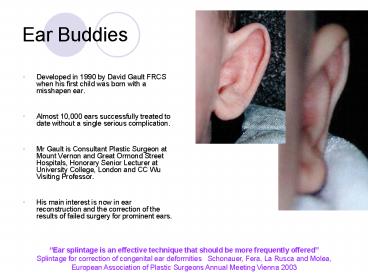Ear Buddies - PowerPoint PPT Presentation
1 / 7
Title:
Ear Buddies
Description:
Mr Gault is Consultant Plastic Surgeon at Mount Vernon and ... Most surgery to correct non-microtia ear deformity is unnecessary and potentially dangerous ' ... – PowerPoint PPT presentation
Number of Views:513
Avg rating:3.0/5.0
Title: Ear Buddies
1
Ear Buddies
- Developed in 1990 by David Gault FRCS when his
first child was born with a misshapen ear. - Almost 10,000 ears successfully treated to date
without a single serious complication. - Mr Gault is Consultant Plastic Surgeon at Mount
Vernon and Great Ormond Street Hospitals,
Honorary Senior Lecturer at University College,
London and CC Wu Visiting Professor. - His main interest is now in ear reconstruction
and the correction of the results of failed
surgery for prominent ears.
Ear splintage is an effective technique that
should be more frequently offered Splintage for
correction of congenital ear deformities
Schonauer, Fera, La Rusca and Molea, European
Association of Plastic Surgeons Annual Meeting
Vienna 2003
2
The Problem
- 1 in 20 adults have ears sticking out more than
40 degrees from the side of the head. - Over 35 of adults admit to feeling embarrassed
about their ears. - At least 1 in 20 bat ear operations go wrong, and
1 in 20 of these are severely deforming. - The average cost of a legal claim against the NHS
for failed bat ear surgery is 100,000. - Most children with untreated ear deformity endure
years of teasing. - Most surgery to correct non-microtia ear
deformity is unnecessary and potentially
dangerous
All parents felt that auricular moulding was
worthwhile. Correction of deformational
auricular anomalies by moulding - results of a
fast-track service. Tan, Wright, Hemphill,
Ashton, Evans. ... Journal of the New Zealand
Medical Association, , Vol 116 No 1181
3
The Solution neonatal moulding
- Over two-thirds of ear deformities are obvious at
birth. - Most ear deformities are completely fixable
within 2-3 weeks of birth by splintage. - Success with splintage over six months of age is
still possible with determination
Early splintage of pinna abnormalities in the
neonatal period appears a cost effective and
simple procedure which should be encouraged -
ENT News
4
Ear Buddies
Bat ears
- Easy for parents to fit.
- Splint is fixed into the scaphal hollow just
within the rim and the ear then taped back. - Success rate (all comers - newborn to one year,
but most over 6 months) - 80 - Newborns only success rate over 95
- Hat simply covers splints, but at least doubles
compliance - Full telephone and e-mail support by doctors and
overseen by Mr Gault
Excellent results .couldnt believe the
difference 100 improvement Mrs O, Trowbridge
5
Correctable conditions
Bat ears
Stahls bar
Cryptotia
6
Correctable conditions
Lop ear
Cup ear
Rim kink
7
Clinical Practice Recommendations
- All babies with obviously prominent or deformed
ears should be fitted with Ear Buddies as soon as
possible, and preferably in the first week of
life. - One third of sticking-out ears do not develop
until three months, and particularly if there is
a strong family history of prominent ears,
consideration should be given to splinting even
normal ears for just two weeks at birth. - Failing this, Ear Buddies should be fitted
without delay as soon as ear prominence is noted. - Ears which are pushed forwards by breast feeding
or by the shoulder on head turning are at risk of
prominence and deformity and should be splinted.































